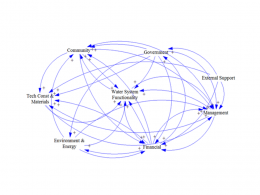RWSN Library

Author
Walters, J. P. and A. M. Javernick-Will
Year of Publishing
2015
Publisher
University of Colorado
Institution
Long-term Functionality of Rural Water Services in Developing Countries: A System Dynamics Approach to Understanding the Dynamic Interaction of Factors
Summary of academic paper
Description:
Research has shown that sustainability of rural water infrastructure in developing countries is largely affected by the dynamic and systemic interactions of technical, social, financial, institutional, and environmental factors that can lead to premature water system failure. This research employs system dynamics modeling, which uses feedback mechanisms to understand how these factors interact dynamically to influence long-term rural water system functionality (i.e., sustainability). To do this, the research first identified and aggregated key factors from literature, then asked water sector experts to indicate the polarity and strength between factors through Delphi and cross impact survey questionnaires, and finally used system dynamics modeling to identify and prioritize feedback mechanisms.
This is a 1 page summary of: Long-Term Functionality of Rural Water Services in Developing Countries: A System Dynamics Approach to Understanding the Dynamic Interaction of Factors, Environ. Sci. Technol., 2015, 49 (8), pp 5035–5043
Bibliographical Information:
Walters, J. P. and A. M. Javernick-Will (2015) Long-term Functionality of Rural Water Services in Developing Countries: A System Dynamics Approach to Understanding the Dynamic Interaction of Factors. Summary of academic paper , University of Colorado , Boulder, Colorado, USA
More Information
» Full paper on Environment Science & Technology Journal (PAYWALL)
Abstract:
Research has shown that sustainability of rural water infrastructure in developing countries is largely affected by the dynamic and systemic interactions of technical, social, financial, institutional, and environmental factors that can lead to premature water system failure. This research employs system dynamics modeling, which uses feedback mechanisms to understand how these factors interact dynamically to influence long-term rural water system functionality. To do this, the research first identified and aggregated key factors from the literature, then asked water sector experts to indicate the polarity and strength between factors through Delphi and cross impact survey questionnaires, and finally used system dynamics modeling to identify and prioritize feedback mechanisms. The resulting model identified 101 feedback mechanisms that were dominated primarily by three- and four-factor mechanisms that contained some combination of the factors: Water System Functionality, Community, Financial, Government, Management, and Technology, implying these factors were the most influential on long-term functionality. These feedback mechanisms were then scored and prioritized, with the most dominant feedback mechanism identified as Water System Functionality–Community–Finance–Management. This study showcases a way for practitioners to better understand the complexities inherent in rural water development using expert opinion and indicates the need for future research in rural water service sustainability that investigates the dynamic interaction of factors in different contexts.
DOWNLOADS (135)
Long-term Functionality of Rural Water Services in Developing Countries
 Google Übersetzer
Google Übersetzer
